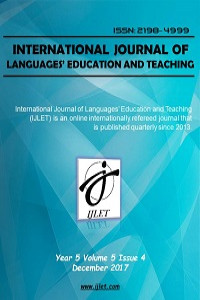Öz
Anahtar Kelimeler
ELT self-assessment reflection teaching English to young learners
Kaynakça
- Arnett, J. (1989). Caregivers in day care centres; Does training matter? Journal of Applied Developmental Psychology. Pp.541-552.
- Bruner, J. (1983). Child’s talk: learning to use language. Oxford: Oxford University Press.
- Cameron, L. (2009). Teaching languages to young learners.Cambridge:Cambridge University Press.
- Creswell, J.W.(2012).Educational research;planning,conducting and evaluating quantitative and qualitative research.Boston MA:Pearson.
- Dickinson, L. (1987).Self-Instruction in language learning. Cambridge: Cambridge University Pres
- Doff, A. (1993). Teach English. Cambridge: Cambridge University Press.
- Ersöz, A. (2000). Six games for the EFL/ ESL classrooms. The Internet TESL Journal. Vol: V1, No.6, June.
- Hair, J.F. Anderson, R.E.Tahtam R.L. & Black W.C. (1998). Multivariate Data Analysis Fifth Edition, Pearson Education Upper Saddle River, New Jersey.
- Harmer, J. (1988). The Practice of English language teaching. England: Longman.
Öz
Teaching a foreign language to young learners have some differences from teaching adults. Young children have concentration problems and they tend to change their mood every ten minutes and need more creative activities than adults. Therefore, foreign language teachers have to choose interesting activities for them and foreign language teacher candidates should learn the correct methods and techniques during their training period. Although some teacher candidates think the solution for training is simply to get all theoretical knowledge, some of them think that solution lies in encouraging the teacher candidates to create their own activities. This descriptive action research paper arises of a quantitative study the purpose of which is to seek the process of ELT students’ development and reflection on teaching English to children. In order to find out language teacher candidates’ ideas about how they improve themselves, five-point Likert scale was prepared. Data collection was achieved by giving the same questionnaires at the beginning and the end of the term at One State University, ELT students in the academic year 2015–2016. 16 male and 32 female students answered the questionnaire. The data were analysed using factor analyses and Levene Test. Findings were examined and some suggestions that focused on language teacher training candidates were put forward.
Anahtar Kelimeler
ELT self-assessment reflection teaching English to young learners
Kaynakça
- Arnett, J. (1989). Caregivers in day care centres; Does training matter? Journal of Applied Developmental Psychology. Pp.541-552.
- Bruner, J. (1983). Child’s talk: learning to use language. Oxford: Oxford University Press.
- Cameron, L. (2009). Teaching languages to young learners.Cambridge:Cambridge University Press.
- Creswell, J.W.(2012).Educational research;planning,conducting and evaluating quantitative and qualitative research.Boston MA:Pearson.
- Dickinson, L. (1987).Self-Instruction in language learning. Cambridge: Cambridge University Pres
- Doff, A. (1993). Teach English. Cambridge: Cambridge University Press.
- Ersöz, A. (2000). Six games for the EFL/ ESL classrooms. The Internet TESL Journal. Vol: V1, No.6, June.
- Hair, J.F. Anderson, R.E.Tahtam R.L. & Black W.C. (1998). Multivariate Data Analysis Fifth Edition, Pearson Education Upper Saddle River, New Jersey.
- Harmer, J. (1988). The Practice of English language teaching. England: Longman.
Ayrıntılar
| Birincil Dil | İngilizce |
|---|---|
| Konular | İkinci Bir Dil Olarak İngilizce, Dil Çalışmaları (Diğer) |
| Bölüm | Araştırma Makalesi |
| Yazarlar | |
| Yayımlanma Tarihi | 30 Aralık 2017 |
| Yayımlandığı Sayı | Yıl 2017 Cilt: 5 Sayı: 4 |

